-
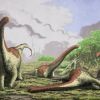 +20 +6
+20 +6New Titanosaur unearthed in Tanzania
Paleontologists at Ohio University have unearthed the partial skeleton of an entirely new species of titanosaur – the massive herbivores that were the largest animals ever to walk on the planet.
-
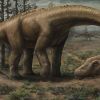 +16 +7
+16 +7Ancient behemoth: Meet Dreadnoughtus, a supermassive dino
A supermassive dinosaur that would have weighed as much as 60 small cars has been found in Argentina, where it likely perished in a bog some 77 million years ago, paleontologists said Thursday, September 4. Dubbed Dreadnoughtus schrani (the 'Dreadnoughtus' part coming from "fear nothing" in old English), the long-necked lizard would have measured 26 meters (85 feet) from nose to tail and weighed some 60 tons – about as much as seven Tyrannosaurus rex put together.
-
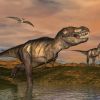 +26 +3
+26 +3Carnivorous Dinosaurs Shrank For Millions Of Years To Evolve Into Present-Day Birds
The ability of a certain type of dinosaur to evolve rapidly into pre-historic birds helped them survive mass extinction.
-
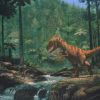 +33 +9
+33 +9'Bad luck' ensured that asteroid impact wiped out dinosaurs
Dinosaurs were wiped out by an asteroid impact when they were at their most vulnerable, according to a new study. Dr Steve Brusatte, of Edinburgh University, said sea level rises and volcanic activity had made many species more susceptible to extinction. They might have survived if the asteroid had hit the Earth a few million years later or earlier, he said, calling it "colossal bad luck".
-
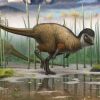 +31 +10
+31 +10Not for plucking
AROUND 150m years ago, in the late Jurassic period, one of the earliest-known birds lived among the tropical islands in an area of the world that is now Europe. The fossilised remains of Archaeopteryx so struck Charles Darwin that he compared them to the skeletal structure of a small theropod dinosaur, and he concluded that feathers evolved in dinosaurs and that birds were their descendants.
-
 +21 +5
+21 +5The man who saved the dinosaurs
Dinosaurs were lumbering, stupid, scientifically boring beasts—until John Ostrom rewrote the book on them.
-
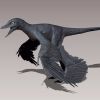 +22 +5
+22 +5World’s largest four-winged dinosaur discovered — and it has massive feathers
In the dinosaur kingdom, the raptor reigns as a pop-culture bogeyman. While not as big as the T. Rex, the feathered creature had a mean set of teeth and claws. But there was at least one refuge from its tyranny: the air.
-
 +31 +4
+31 +4Dinosaurs Found in Mass Grave Died of Drought
The case was cold, but critical clues pointed to a killer's identity in ancient Madagascar
-
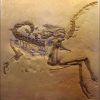 +5 +2
+5 +2An amazing collection of dinosaur remains found in volcanic ash in Siberia
Unique pieces of skin from the late Jurassic era dinosaurs has been uncovered in a natural 'time capsule' by scientists in the Trans-Baikal region.
-
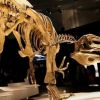 +12 +3
+12 +3Juvenile specimen of Megaraptor (Dinosauria, Theropoda) sheds light about tyrannosauroid radiation
Megaraptorids are a group of predatory dinosaurs that inhabited Gondwana from Cenomanian to Santonian times (Late Cretaceous). Phylogenetic relationships of megaraptorids have been matter of recent debate, being alternatively interpreted as basal coelurosaurs, carcharodontosaurian allosauroids, megalosauroids, and basal tyrannosauroids.
-
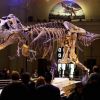 +18 +3
+18 +3Warm blooded or cold? Dinosaurs were somewhere in between
The hot question of whether dinosaurs were warm-blooded like birds and mammals or cold blooded like reptiles, fish and amphibians finally has a good answer. Dinosaurs, for eons Earth's dominant land animals until being wiped out by an asteroid 65 million years ago, were in fact somewhere in between.
-
 +1 0
+1 0'World's largest dinosaur' discovered in Argentina
The largest creature to have ever walked the earth - a dinosaur measuring 130 feet and weighing 77 tonnes - has been discovered in Argentina, palaeontologists have said. Its gigantic bones were found by a local farm worker in a desert in Patagonia, the southern Argentine region that has yielded many important dinosaur discoveries.
-
 +48 +9
+48 +9'Biggest dinosaur ever' discovered
Fossilised bones of a dinosaur believed to be the largest creature ever to walk the Earth have been unearthed in Argentina, palaeontologists say...
-
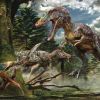 +20 +8
+20 +8New Tyrannosaur named 'Pinocchio rex'
A new type of Tyrannosaur with a very long nose has been nicknamed "Pinocchio rex". The ferocious carnivore, nine metres long with a distinctive horny snout, was a cousin of Tyrannosaurus rex. Its skeleton was dug up in a Chinese construction site and identified by scientists at Edinburgh University, UK.
-
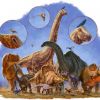 +22 +5
+22 +5How Birds Survived the Dinosaur Apocalypse
When nearly every dinosaur went extinct 66 million years ago, the only ones that survived were those that had shrunk—that is, the birds. Today, there are 10,000 species of these feathered fliers, making them the most diverse of all the four-limbed animals. A new study reveals why this lineage has been so successful: Birds started downsizing well before the rest of the dinosaurs disappeared.
-
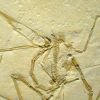 +16 +2
+16 +2China Kryptodrakon fossil discovery may shed light on origin of Pterodactyl
The Origin Of Pterodactyls, The Largest Flying Reptiles Ever To Fly Over The Earth Might Be Linked To The Fossil Discovery In China, Researchers Say.
-
 +2 +1
+2 +1Taking the Kids - five places to get up close and personal to dinosaurs
The teenage boys couldn't resist posing for selfies with the stars of the show. It didn't matter that these stars were the famous dinosaur fossils at the American Museum of Natural History in New York City. If you think kids outgrow dinosaurs by kindergarten, think again. "The dinosaurs were amazing. It is astounding that these creatures once roamed the Earth," said Khaliq Sanda, a high school senior.
-
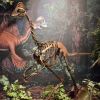 +19 +4
+19 +4A 'chicken from hell' Large feathered dinosaur species discovered
Scientists from Carnegie and Smithsonian museums and the University of Utah today unveiled the discovery, naming and description of a sharp-clawed, 500-pound, bird-like dinosaur that roamed the Dakotas with T. rex 66 million years ago and looked like an 11 ½-foot-long 'chicken from hell.'
-
 +17 +2
+17 +2Dinosaur-Killing Asteroid Triggered Lethal Acid Rain
The oceans became a lethal sulfuric-acid stew after the huge asteroid impact that wiped out the dinosaurs some 65 million years ago, a new study suggests.
-
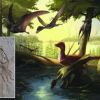 +16 +5
+16 +5China's Jurassic Park yields yet more feathered dinosaurs
Remarkably preserved skeletons dating back 160million years were discovered in rocks beneath the famous Jehol Biota in north eastern China.
Submit a link
Start a discussion




















